Category: Character Education
Having Fun and Staying Positive are Key to Taking on New Experiences
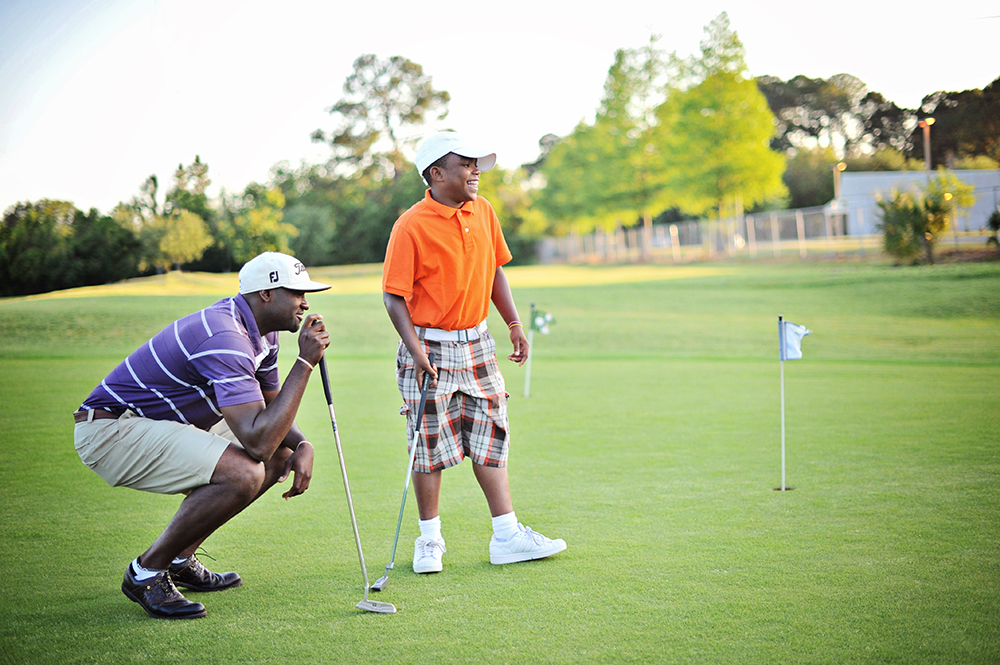
Kids and teens take on new experiences every day – at school, at home and during extra-curricular activities – it’s part of growing up. As youth expand their horizons and experience new things, some lessons will come easy and others will be hard. It’s how we react that matters. Here are three tips to inspire you:
Be Patient
Patience means staying calm while you wait, success comes with practice and experience. Patience means giving yourself lots of chances to succeed by trying again and again.
Be Positive
Enjoy what you are doing regardless of the outcome. A positive attitude will not only make you feel better, it will help you DO better. When situations get difficult, rather than get upset, focus on what went right. Then, figure out what you could do better next time. If you have a good attitude and stay positive, it will help you enjoy what you are doing.
Ask for Help
It’s OK to ask for help; it’s how you learn. You should always feel comfortable asking your teachers, coaches and friends for help. Asking for help from others is a much better option than struggling alone. Any challenges you face can be made easier if you tackle them together.
If you can follow these practices these tips, any new experience can turn into a positive one.
Character Building Programs for Kids
Empowering kids and teens through a lifetime of new experiences is at the heart of First Tee. With programs in all 50 states and select international locations, First Tee provides active learning experiences for youth that help build their inner strength, self-confidence and resilience. First Tee impacts more than 3.6 million youth each year, helping to strengthen their character through the game of golf.
Bryson Hughes, First Tee – North Florida and Megan Meng, First Tee – Greater Trenton win Pro-Junior Titles at PURE Insurance Championship at Pebble Beach
Three First Tee teens ace holes 5, 7 and 17 at the iconic course
PEBBLE BEACH, Calif. (Sept. 25, 2022) – Seventy-eight First Tee teens from across the country had the opportunity to learn from the game’s legends and explore possibilities in golf and beyond during the PURE Insurance Championship impacting First Tee, an official PGA TOUR Champions event, which concluded today at Pebble Beach.
Bryson Hughes representing First Tee – North Florida and paired with Alex Cejka, and Megan Meng representing First Tee – Greater Trenton and paired with Charlie Wi, claimed the male and female Pro-Junior titles today, respectively. Hughes and Cejka finished 18-under and won in a scorecard playoff, while Meng and Wi capped off the event 22-under.
The PURE Insurance Championship, in its 19th year, brings 78 teens from First Tee chapters nationwide to Pebble Beach Golf Links and Spyglass Hill Golf Course. Throughout the week the teens apply character strengths to play at an elite level at an iconic golf course where they are paired with and mentored by a PGA TOUR Champions player and amateurs from the business world. The annual event, hosted by the Monterey Peninsula Foundation, was televised internationally on Golf Channel.
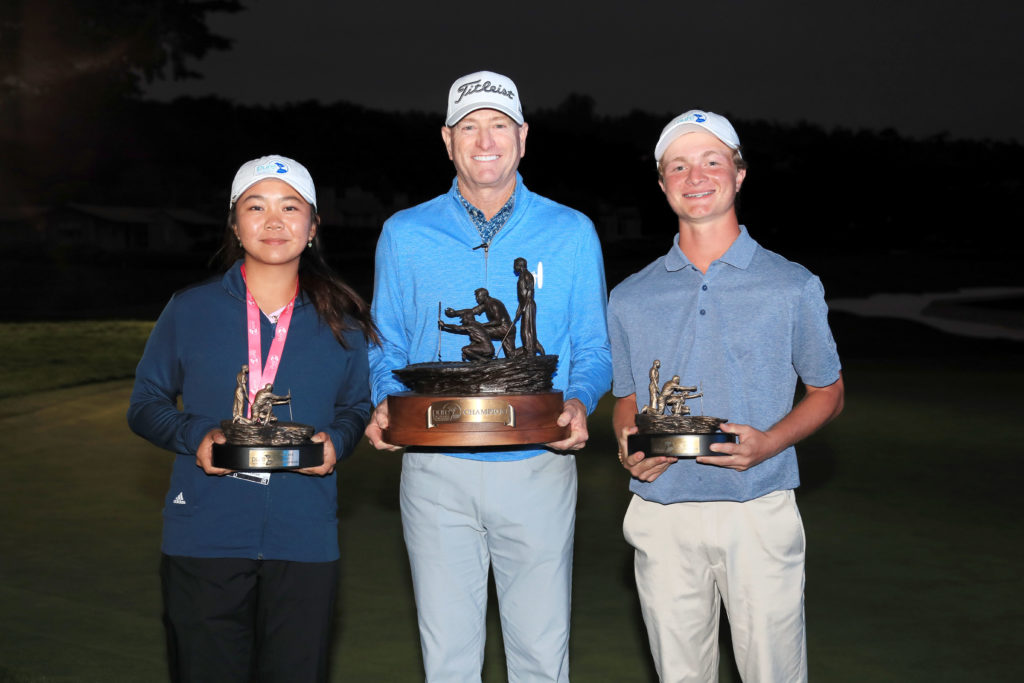
Three teens in the field made holes-in-one at Pebble Beach during their tournament practice rounds – Cooper Groshart from San Louis Obispo, Calif. on #7 (video), Theresa Shaw from Auburn, Calif. on #17 (video) and Sophia Bardunias from San Ramon, Calif. on #5 (video).
“We are proud of all the teens who played with confidence and composure this week at the PURE Insurance Championship,” said Greg McLaughlin, First Tee CEO. “These young people exemplify the character and values we instill through the First Tee programs every day. A special congratulations to Bryson and Megan for winning the Pro-Junior titles. Thank you to our partners – PURE Insurance, PGA TOUR Champions, Chevron, Monterey Peninsula Foundation and Golf Channel – for making this a special week for 78 First Tee participants.”
Hughes is a 15-year-old sophomore at Creekside High School in St. Johns Country, Fla. where he holds a 3.8 GPA. He has been involved with First Tee – North Florida for nine years and playing in this tournament has been a goal since he first watched it on TV as a six-year-old. Hughes holds a +2.3 handicap and is the No. 1 player on the golf team at Creekside High School.
“Thanks to PURE Insurance and First Tee for an amazing experience,” said Hughes. “Pebble Beach is golf heaven and it feels great to get a win at such a cool course. I’ve tried to make the most of this week by focusing on what I could learn from Alex and all the pros in the field. My biggest takeaway is how well they handle themselves during high-pressure situations.”
Meng is a 16-year-old junior at Hopewell Valley Central High School in Pennington, NJ where she holds a 4.5 GPA. She’s been involved with First Tee – Greater Trenton for nine years and has progressed from participant to volunteer junior coach mentoring the younger participants in the program. Meng holds a +2.3 handicap and aspires to play collegiate golf. She was named 2022 NJ.com Golfer of the Year.
“I’ve worked really hard to get to this moment,” said Meng. “But the biggest thing I’ve learned this week is that golf is meant to be fun. I’ve had a really great time and I’ve made memories I’ll carry with me for the rest of my life. I’d like to thank my pro Charlie, PURE Insurance and First Tee for this opportunity.
During the week, First Tee partners PURE Insurance and Chevron both hosted events to celebrate their commitment to First Tee’s mission and raise additional funds to support the First Tee College Scholarship Program. Leaders from PURE Insurance extended a surprise invitation to the scholarship program to 17-year-old Isabelle Junio, a high school senior from First Tee – Phoenix. The program pairs Scholars with a mentor and provides professional development workshops and financial assistance throughout the college experience.
First Tee is a youth development organization that teaches life skills and helps kids and teens build their strength of character through golf. The PURE Insurance Championship is one of several national opportunities provided by First Tee Headquarters to encourage and motivate participants as they progress through the program and toward higher education opportunities.
To access photos from the event, visit here. For more information on the tournament, visit PUREInsuranceChampionship.com. To learn more about First Tee and see the full field list, visit TheFirstTee.org.
***
About PGA TOUR First Tee Foundation (“First Tee”)
First Tee (www.firsttee.org) is a 501(c)(3) nonprofit youth development organization that is supported by the PGA TOUR. Its mission is to impact the lives of young people by providing educational programs that build character and instill life-enhancing values through the game of golf. In 2022, First Tee celebrates its 25th anniversary and reaching millions of youth through its network of 150 chapters, 10,000 schools and 1,700 youth centers. Headquartered in Ponte Vedra Beach, Florida, USA, programs are delivered in all 50 United States and select international locations. President George W. Bush serves as Honorary Chair.
About Monterey Peninsula Foundation
Monterey Peninsula Foundation is a 501 (c)(3) nonprofit organization which donates funds from the proceeds of the AT&T Pebble Beach Pro-Am on the PGA TOUR and the PURE Insurance Championship Impacting the First Tee, a PGA TOUR Champions tournament. The Foundation focuses on improving the quality of life in Monterey, Santa Cruz, and San Benito counties.
www.pureinsurancechampionship.com
About PURE Insurance
Privilege Underwriters Reciprocal Exchange (PURE) Insurance is a property and casualty insurance company designed exclusively for successful, responsible families. We opened for business more than 15 years ago with the goal of offering something different in the insurance space: a company focused on doing what’s right for our membership (policyholders), one that promotes transparency and alignment of interests, and delivers greater value.
Today, after growing at least 15% in each year since we began, we are the most awarded insurer in our category, offer coverage in all 50 states that includes high value homeowners, automobile, collections, watercraft, personal excess liability, fraud & cyber and flood to a membership of more than 100,000 individuals and families.
Pureinsurance.com | 888.813.7873
About PGA TOUR Champions
PGA TOUR Champions is a membership organization of professional golfers age 50 and older, including 34 members of the World Golf Hall of Fame. The Tour’s mission is to provide financial opportunities for its players, entertain and inspire its fans, deliver substantial value to its partners, create outlets for volunteers to give back and generate significant charitable and economic impact in tournament communities. Follow PGA TOUR Champions online at PGATOUR.com, at facebook.com/PGATOURChampions, on Twitter @ChampionsTour and on Instagram @pgatourchampions.
All events are televised in the United States, with most receiving complete coverage on Golf Channel, the exclusive cable-television partner of PGA TOUR Champions. Tournament programming is available via 25+ TV linear partners in 145+ countries and territories, with 25 channels carrying long-form and/or highlights coverage, and 200+ hours of live coverage distributed in 135+ countries and territories. Programming is also available via the OTT platform GOLFTV powered by PGA TOUR in every market outside of the United States, excluding China and Korea, with live coverage distributed in 130+ countries and territories.
Participant BJ Little shares love of golf: “I want that to be a piece of my legacy”
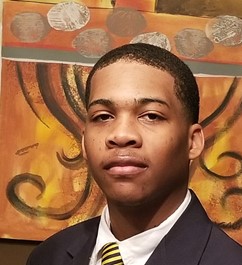
With a perfect 4.0 GPA and student government experience under his belt, BJ Little wants to change the world. He aims to become a criminal defense attorney, U.S. Senator and eventually, President of the United States.
But first, BJ is focused on serving his community. Starting with his high school.
When BJ entered his freshman year at Cristo Rey Atlanta Jesuit High School there was no golf team. BJ wasn’t going to sit idly by, he was determined to form a team.
“In my freshman year, the very first thing I did was ask for the school to start a golf team,” says BJ. “The school went through all of the necessary preparations for the golf team to start, but then Covid happened.”
For BJ, and most of the country, school was now virtual for the next year and half, halting all chances for the team.
But BJ says the pandemic did not discourage him from achieving his goal.
“Going into my junior year I went in with the same mindset I had freshman year. I asked the school for a golf team, and they delivered.”
BJ helped by recruiting players and finding a practice facility. Leveraging his go-to team, a concept taught and encouraged at First Tee, he smartly enlisted help from his coach and director of golf operations at First Tee – Metro Atlanta Jeff Dunovant. They worked out a plan that the school could use the chapter’s facilities while BJ secured players for the team.
In 2021, the team officially launched. But there was still much work to do.
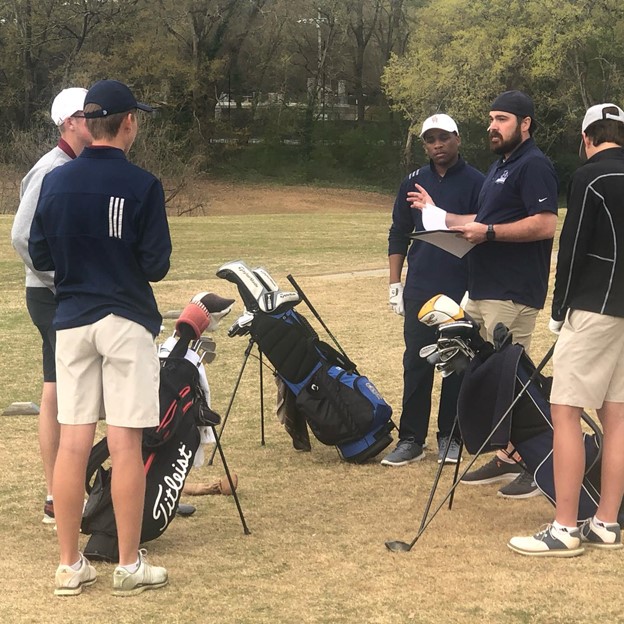
“BJ was the only player on the team who was not a beginner, so the practices would consist of BJ and I teaching the new players,” says Dunovant.
And for BJ, that’s what it’s what this is all about.
“In all honesty I just want people to have fun. The State and District titles will come with time. But ensuring students are happy and want to learn about golf is the most important thing to me. I hope that when I graduate Cristo Rey, students will still be playing golf. I want that to be a piece of my legacy to the school.”
BJ is one of 78 First Tee participants teeing off this Friday at the PURE Insurance Championship. The tournament pairs First Tee teens with PGA TOUR Champions players providing life-changing mentoring opportunities for the teens. This experience opens the participants’ eyes to the possibilities in golf and beyond as they are contemplating their future education and careers.
The tournament airs on Golf Channel.
PURE Insurance Surprises First Tee Participant with Scholarship at the 2022 PURE Insurance Championship
PURE Insurance Grows Its Support of First Tee with a Commitment for $1M to the First Tee College Scholarship Program
PEBBLE BEACH, CALI., Sept. 22, 2022 – First Tee®, a youth development organization that helps kids and teens build their strength of character through golf, announced Isabelle Junio as a First Tee Scholar for the Class of 2023, thanks to the support of PURE Insurance.
PURE Insurance has served as title sponsor of the PURE Insurance Championship Impacting First Tee since 2017. Since coming on board as title sponsor, PURE has continued to deepen its relationship with First Tee, most recently with their support of First Tee College Scholarship Program through a commitment of $1M over five years.
Leaders from PURE Insurance extended a surprise invitation to the scholarship program to 17-year-old Isabelle Junio, a high school senior from First Tee – Phoenix, yesterday at the PURE Insurance Championship. Junio is a senior at Millennium High School with a GPA of 4.58. She volunteers for the Agua Fria Fine Arts Festival and aspires to become an engineer.
“Our admiration for and support of this incredible organization continues to grow,” said Katherine Richardson, EVP, Chief Human Resources Officer at PURE Insurance and Head of PURE Foundation. “It’s particularly gratifying to know that we can impact the remarkable young men and women of First Tee, like Isabelle, in such a powerful way.”
The surprise happened during a private fundraising event hosted by PURE and benefiting the First Tee College Scholarship program.
Earlier this year, First Tee announced the Class of 2022 First Tee Scholars. With 25 Scholars, it’s the largest to date and includes Jacob Zakaria who was surprised by PURE at the 2021 PURE Insurance Championship.
Junio, Zakaria and all the scholars in the program are paired with dedicated, trained adult mentors who will help encourage them throughout their college experience, including virtual and in-person meetups. In addition, the scholars have access to professional development workshops, financial assistance, and help securing internships and job placement. PURE Insurance employees will serve as mentors and the company will contribute to professional development and educational sessions, sharing industry knowledge and expertise with the scholars, as well as offer internship opportunities.
“Pursuing a college degree is both competitive and challenging for today’s graduating high school students,” said Greg McLaughlin, First Tee CEO. “We’re grateful for PURE Insurance’s commitment to our mission through the PURE Insurance Championship, and now through the First Tee College Scholarship Program. This meaningful partnership will allow us to support more First Tee alumni through their college experience with the support of PURE Insurance and its dedicated employees.”
With the support of PURE Insurance and other generous donors, First Tee will expand the Scholarship Program to more than 200 Scholars by 2030. To learn more about First Tee, please visit https://firsttee.org/.
Overcoming Obstacles: First Tee Teen Going to Pebble Beach
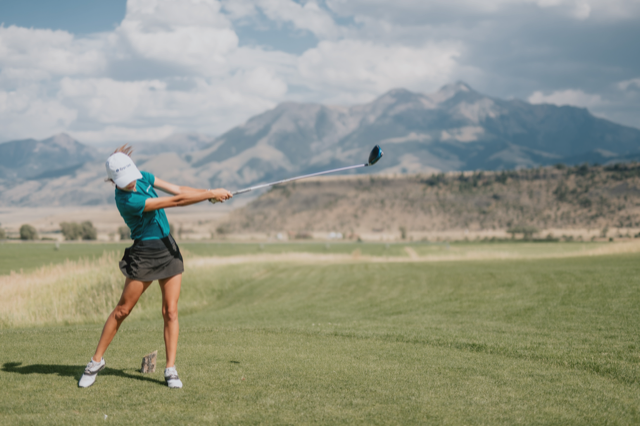
Isabella Lohr was in for a big surprise earlier this year.
She met PGA TOUR player and First Tee alum Austin Smotherman during the AT&T Byron Nelson in May, where he told the 17-year-old from First Tee – Dallas that she was selected to play in the 2022 PURE Insurance Championship.
Isabella is one of 78 First Tee participants who will tee off at Pebble Beach during the tournament, which will take place Sept. 23-25, 2022 and airs on Golf Channel.
“It’s the greatest honor anyone could receive, playing at Pebble Beach,” she said.
The welcome news came after a tough time for Isabella. She lost her childhood friend Dylan Dorrell on August 13, 2020, at the age of 17. He collapsed at a cross country practice and died at the hospital from an undetected heart condition. She says it’s the hardest experience she’s had to overcome.
“Grief was an obstacle I was not ready to face in life. It was a tremendous loss for me personally as every fond memory I had as a child included him.”
Shortly after Dylan’s passing, his parents created a foundation, #runforDylan in his memory.
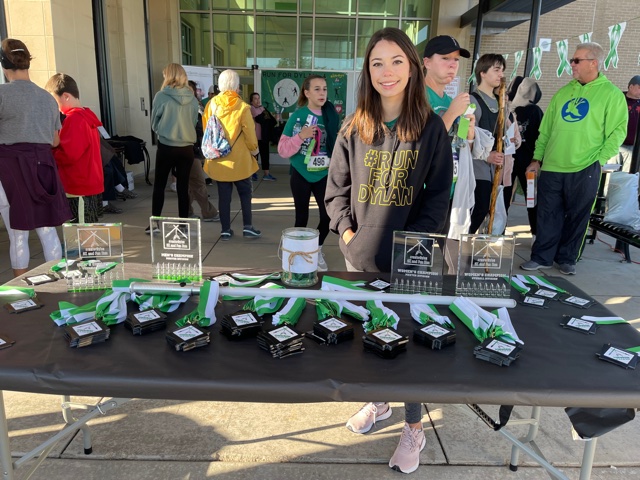
“We were all still grieving but watching his parents turn their grief into a positive helped me gain a different perspective on life’s purpose.”
Isabella decided she too would honor his memory. In addition to nine years with First Tee, Isabella has been involved with Girl Scouts for more than a decade and decided to focus her Gold Award Project on raising funds for the #runforDylan Foundation.
Her project focused on organizing an annual 5K fun run to build awareness and gain funds for the foundation. More than 800 people participated in the inaugural event on the morning of November 6, 2021, raising close to $25,000. The proceeds will help fund AEDs at local parks in the community.
***
First Tee is celebrating its 25th anniversary of teaching life skills through the game of golf. Follow the PURE Insurance Championship at PGATOUR.com.
The Power of the PURE Insurance Championship: First Tee Alumni Success Stories
For the last 19 years, the PURE Insurance Championship has welcomed teens from First Tee chapters nationwide to Pebble Beach Golf Links and Spyglass Hill Golf Course. Throughout the week the teens apply the life and leadership skills learned from First Tee programs during an event where they are paired with a PGA TOUR Champions player and amateurs from the business world.
For many of the teens who are selected for the tournament, the experience opens their eyes to the possibilities in golf and beyond as they are contemplating post-secondary education and careers, and in some cases, managing fears and emotions. This week, we take a look at several alumni who played in this tournament and how they’ve applied the lessons they learned from First Tee and this experience to reaching for their dreams.
Michelle Xie, First Tee — Silicon Valley
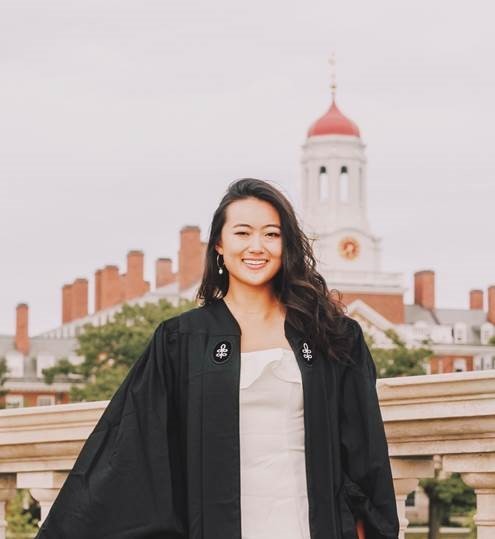
Played in 2013 with Kirk Triplett
Michelle recalls her participation in the PURE Insurance Championship as a once-in-a-lifetime opportunity. She played and won the tournament in 2013 alongside Kirk Triplett. The two established an immediate connection, which led to coachable moments on how to manage the mental and physical demands of the game – both on and off the course.
Nothing compared to the exhilaration, nerves and pressure Michelle felt walking down the fairway with Triplett as their pro-junior team was in contention. Those moments of mentorship provided Michelle great perspective to deal with the rigorous schedule of being a student-athlete at Harvard University.
Michelle graduated from Harvard in 2019 with a degree in molecular and cellular biology. She played on the women’s golf team, receiving numerous accolades including being named the 2018 Ivy League Individual Champion and was voted as team captain her senior year.
In 2019, Michelle moved back to the Silicon Valley and is working as a software engineer. Although she is not spending as much time at the golf course as she once did, Michelle still uses the many time management and problem-solving skills she learned from competitive golf and First Tee. Now that Michelle is back home, she has become a volunteer coach at the First Tee — Silicon Valley to mentor the next generation of participants.
Rayshon Payton, First Tee — Metropolitan Oklahoma City
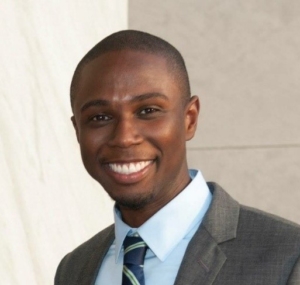
Played in 2005 with Gil Morgan
An alumus from First Tee — Metropolitan Oklahoma City, Rayshon remembers watching the U.S. Open at Pebble Beach on TV in 2000. From that point on, he dreamed of playing on the course one day himself. This dream became a reality in 2005 when he was selected for the PURE Insurance Championship, paired with PGA TOUR Champions player Gil Morgan. They found themselves in the final pairing on Sunday at Pebble Beach where Rayshon ended up holing out from the 12th bunker on national television.
Rayshon has continued to pursue his dreams off the course. He interned at The White House, working in the office of Public Engagement and Intergovernmental Affairs where he had the opportunity to work with Former U.S. Secretary of Education Arne Duncan and White House Senior Advisor Valerie Jarrett. Today, he is a graduate of the University of Oklahoma, College of Law, and has since held positions with the Senate Democratic Steering and Outreach Committee and Representatives Kendra Horn (D-Oklahoma) and Mike McIntyre (D-North Carolina).
Rayshon currently works as an Attorney Advisor in the Office of Legislative Affairs at the US Department of Justice.
Sara Scarlett, First Tee — Greater Sacramento
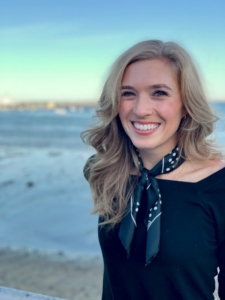
Played in 2011 with Jerry Pate
Being selected for the PURE Insurance Championship is a goal for many First Tee participants. That was definitely the case for alumna Sara Scarlett.
She joined First Tee around the same time that she was diagnosed with scoliosis, a curvature of the spine. Sara’s confidence was low, and she was struggling to balance her medical needs with the desire to have an active and social childhood. First Tee became her sanctuary – a place where she learned the life skills and core values that would ultimately shape her into a confident teenager who always looked on the “bright side.”
In 2011, she played in the PURE Insurance Championship with Jerry Pate. Some of Sara’s favorite memories include chipping in on the 10th hole at Pebble Beach and the motivational talks with her partner. Sara went on to play on the women’s golf team at University of Texas, graduating in 2017.
Sara has grown the last few years in her career and is currently working as a Digital Director . Sara says she is lucky to have been taught the value of diversity at a young age from First Tee.
Taryn Yee, First Tee — Greater Sacramento
Played in 2009 with Jim Thorpe
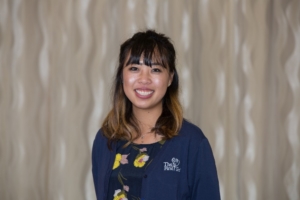
For alumna Taryn Yee, playing in the PURE Insurance Championship was the first major goal she set for herself and accomplished on her own merit. Yee claims that she felt like a star when she first arrived at the 2009 PURE Insurance Championship at Pebble Beach. Taryn played with Jim Thorpe, and she says the biggest takeaway was how confident she was at the end of the tournament. The PURE Insurance Championship and the lessons she learned there have provided her self-confidence that she carried with her through college and now into her successful career.
Taryn was a student-athlete at University of California, Irvine. As a freshman, she was selected to attend the PwC Executive Forum at THE PLAYERS Championship as an alumni opportunity with First Tee. At the event, she met PwC executives, spoke with clients and was introduced to the business industry and public accounting. This experience led to a new goal for Taryn, which was to graduate with an accounting degree and become a Certified Public Accountant (CPA). She accomplished that goal, which ultimately led her to career opportunities at PwC, The Gap, and her current position at Facebook headquarters.
Through setting goals and perseverance, Taryn has been able to stay positive and work through challenges to achieve her goals.
“I have the confidence that I can accomplish anything. There is no such thing as an intangible goal!”
Justin Potwora, First Tee — Greater Portland
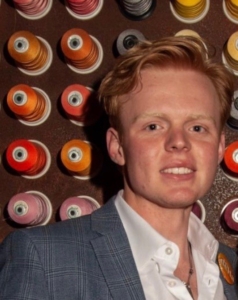
Played in 2017 with Bernhard Langer
It wasn’t too long ago that alumnus Justin Potwora was holding up the PURE Insurance Championship trophy with his partner, Bernhard Langer. Meeting First Tee participants from across the country and hearing about their experiences and perspectives left a lasting impact on Justin.
Justin graduated this spring from Southern Methodist University where he majored in finance. During his time in college, he was the Philanthropy Chair for his fraternity which raised more than $50,000 for Huntsman Cancer Foundation. Just is currently working as an Investment Banking Analyst for UBS in their Americas Energy Transition Group. He credits First Tee with teaching him how to act professionally, selflessly and never compromise his character and values in whatever he sets out to accomplish.
John Louie, First Tee — Monterey County
Played in 2009 with Donnie Hammond
Played in 2010 with Bobby Clampett
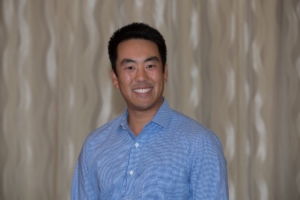
John joined First Tee — Monterey County not long after its inception in September 2004. John attended Salinas High School, but had visions of achieving more. One day he told his father that by using “Goal Setting,” a life skill he had learned at First Tee, he had set a goal to attend Stevenson High School. John applied himself and with his parents’ support, John became a Stevenson “Pirate.”
John competed on the golf team for Stevenson and represented First tee — Monterey County in the 2009 and 2010 tournaments at Pebble Beach.
John was accepted to Middlebury College in Vermont, playing on the men’s golf team for three years. He was tempted to stay on the East Coast and work in finance in New York City like many of his fellow Panthers. However, his heart was in Salinas and the agricultural town where he grew up. He was offered a position with Tanimura & Antle, one of the top agricultural companies in Salinas.
He has since worked his way up the company and now leads one of the firm’s recent acquisitions, PlantTape. John serves on the Board Committee for Taylor Farms Center For Learning. In 2018, he was nominated as a member of the Board of Directors of First Tee — Monterey County, where he continues to give back by mentoring teens in the program.
Learn more about how we provide access to the game and new opportunities through our character-building programs.
Four Teens Earn Selection into the First Tee College Scholarship Program
PONTE VEDRA BEACH, FL. (September 12, 2022) – First Tee participants from Minnesota, Massachusetts, San Francisco and Orange County, Calif. have each been awarded scholarships and selection in to the First Tee College Scholarship Program. The teens were selected following their participation in the First Tee Leadership Series and Summit in partnership with PGA TOUR Superstore based on their intentional and innovative commitment to personal growth and development as leaders throughout the course of the program.
First Tee and PGA TOUR Superstore congratulate:
- Gabriella Mercado from First Tee – Orange County: Gabriella is a 16-year-old high school junior from Placentia, Calif. She’s been involved with First Tee for seven years. She holds a 4.0 GPA and has aspirations of playing college golf and then becoming a sports lawyer. Gabriella enjoys community service and in her first two years of high school accumulated more than 225 hours.
- Jaylyn Remolona from First Tee – San Francisco: Jaylynis a 15-year-old high school junior from San Francisco. Jaylyn attends Mercy High School in Burlingame has been involved with First Tee for seven years. She holds a 3.65 and outside of school her two hobbies are golf and singing.
- Kyzar Joshi from First Tee — Massachusetts: Kyzar is 17-year-old high school senior at Ashland High School in Ashland, Mass.He has been involved with First Tee for more than 10 years. He holds a 4.12 GPA and his career aspirations include playing college golf and majoring in finance or economics in college. Kyzar serves as his class treasurer, and helped lead the Ashland High School golf team to the state section tournament. Kyzar is in the process of completing the ACE level of the First Tee Curriculum.
- Saloni Somia from First Tee – Minnesota: Saloni, from Plymouth, Minn.,is a17-year-old high school senior at Minnetonka High School. She has been involved with First Tee for four years. She holds a 4.0 GPA and serves as the President of her school’s National Honor Society, Captain of the Minnetonka Girls Golf Team, Founder and President of Everyone Eats (an organization that provides homeless youth allergy friendly foods) and co-founded a teen-led YouTube channel that gives good allergy advice to teens.
As First Tee Scholars, the teens will receive support throughout their post-graduate careers. The need and merit-based program provides scholarships up to $5,000 per year, renewable for up to four years of college admission. In addition, each scholar is paired with a dedicated, trained adult mentor who will help encourage and guide them throughout the college experience, including virtual and in person meetups. The program also provides professional development workshops held in person throughout the year.
“We are very proud of these four deserving teens from across the country,” said Greg McLaughlin, First Tee CEO. “They each showed dedication and impressive character traits throughout the Leadership Series and Summit. They are leaders in their schools, at home and at their First Tee chapters. Through the First Tee College Scholarship Program, we will continue to support them in their personal and professional development and empower them to hone their leadership skills as they pursue their careers. We’re thankful for partners like PGA TOUR Superstore who support these game changing initiatives.”
The four teens were selected from the more than 250 participants who attended the Leadership Series and Summit. Boasting an average GPA of 3.9 the teens meet the College Scholarship Program eligibility requirements which are based on academic performance, length and involvement in First Tee programs, financial need and commitment to volunteerism.
First Tee College Scholarship Program is made possible by donors and corporate partners who stand behind the program and First Tee’s mission. For more than a decade, PGA TOUR Superstore and PGA TOUR Superstore Chairman Arthur M. Blank have championed First Tee’s mission through charitable and in-kind donations across the country. In September 2020, PGA TOUR Superstore announced a new grant that will help First Tee reach more youth across the U.S. and strengthen its curriculum for teenage participants, including the development of the Leadership Series and Summit.
“We are committed to being a positive influence in our communities and truly believe in the positive impact sports has in developing and supporting youth,” said Dick Sullivan, President & CEO, PGA TOUR Superstore. “We are proud to partner with the First Tee to empower young people with values-based leadership skills that will help them succeed throughout the course of their life. Congratulations Gabriella, Jaylyn, Kyzar and Saloni.”
Photos and broll of the Scholars is available here.
The Key to Setting Reachable Goals
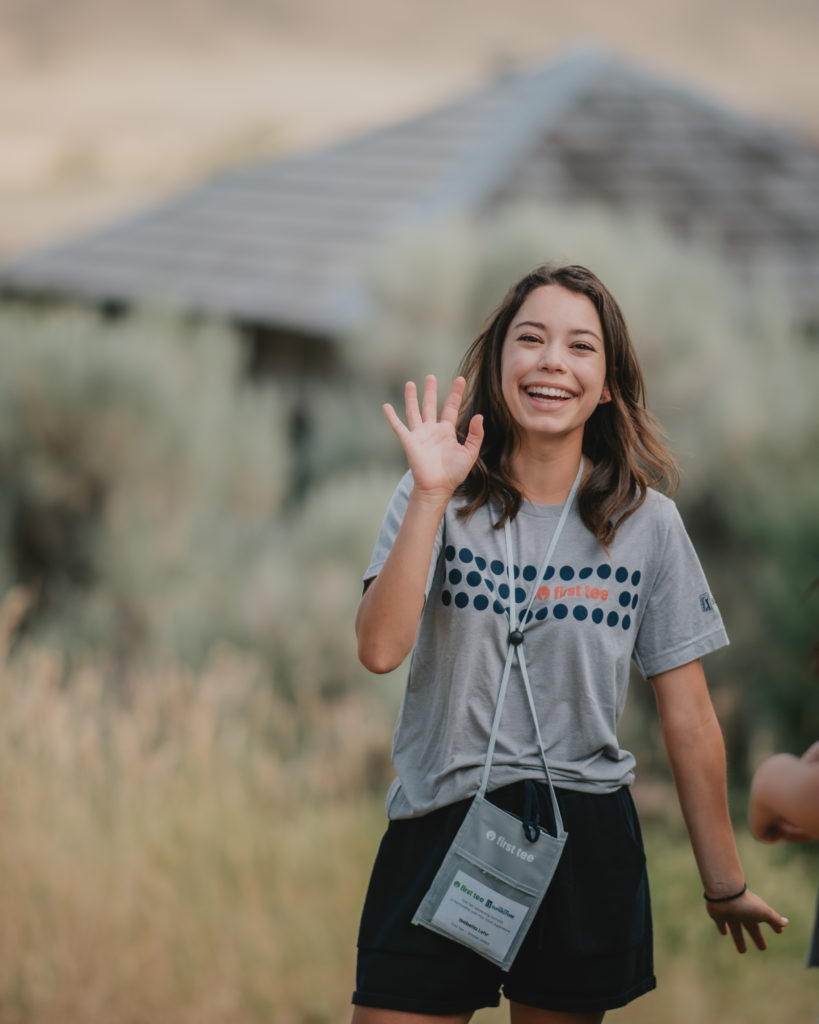
Have you ever thought about your achievements in life? What were the dreams and ambitions that you wanted to work towards? How did you get there? At First Tee, these are the type of questions we propose to kids and teens to help them understand the process of attaining goals; but to reach their goal, they must first understand how goals are formulated.
A goal is something that you want to do, be or have, but it’s not something that you can do, be or have right at this moment. It’s something you must work to get in the future, and you can apply that to any challenge in life. For example, if your child wants to achieve Honor Roll and receive all As and Bs in school this year, what would that require them to do? They would need to do well on tests and assignments. How would they accomplish that? Encourage them to take good notes, turn in their work on time, and study for their tests.
For kids, having guidelines or tools can effectively help them identify their goals and make them feel comfortable about reaching them. At First Tee, we utilize four guidelines to do this. Talk to your child about the dreams they currently have and try these out for yourself.
Four Guidelines for Setting a Reachable Goal:
- The goal is Positive:
- I want to achieve a passing score of 80% or higher vs. I don’t want to fail this test
- The goal is Important to You:
- The goal needs to be important to you, not to someone else. You should be able to explain why you want to achieve it and why it will make a difference for you.
- The goal is Specific:
- You want to know exactly what you’re working toward.
- The goal is Under your Control:
- Your efforts will allow you to achieve this goal vs. Something that is out of your control like becoming famous or winning the lottery.
Goal setting is a strategy kids and teens will apply for the rest of their life. When we set our goals, we want to be very clear about them so that we have the best chance to achieve them. The key to remember is that goals come in all shapes and sizes. Just because it doesn’t work for someone else doesn’t mean that you can’t achieve it. Your kids will learn from both their achievements and setbacks, but as they begin to set personal goals, they will learn and grow in ways that you did not think possible.
Want to get involved with what we are building at First Tee? Click here to find out more.
A Game for All
First Tee Chapters provide inclusive golf and character building programs for all kids and teens
By Megan Hart, First Tee HQ
About a quarter of Americans have a disability, according to the Centers for Disease Control and Prevention, but as many organizations have redoubled their focus on diversity, equity and inclusion in recent years, this group can often go overlooked in discussions on the topic.
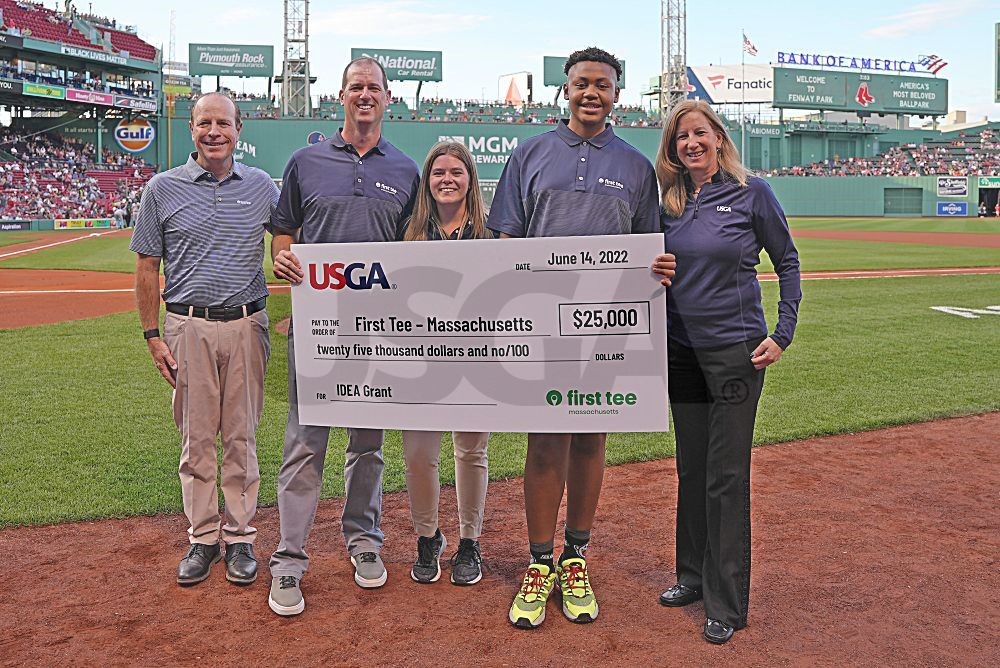
For 25 years, First Tee has shown up every day, determined to ensure that every kid and teen feel welcome and included. First Tee – Greater Cincinnati & Northern Kentucky is just one example of our Chapters who promote inclusive programs.
The Chapter partners with organizations like Els for Autism, Special Olympics of Hamilton County and SCRATCHgolf to serve players of all abilities and skill levels, proving golf is for everyone.
Thanks in part to the United States Golf Association’s IDEA Grant, the chapter has been able to expand its opportunities for all kids. The IDEA Grant was created to promote inclusion, diversity, equity and accessibility efforts at the local golf level. This grant program awarded $200,000 from USGA to First Tee Chapters across the country in 2021.
“USGA’s support is a game changer for the youth in the communities that we serve,” said Greg McLaughlin, First Tee CEO. “With these grants, our chapters are opening the door to even more youth, especially in underserved and underrepresented communities, to explore the possibilities in golf and beyond as they build their character and life lessons through the game.”
The USGA’s efforts to make golf more inclusive go far beyond its work with First Tee. The association will host the inaugural U.S. Adaptive Open at Pinehurst this July, which will feature the globe’s top golfers with disabilities, including those with limb impairments, intellectual and neurological impairments and seated golfers. Among the field is First Tee — Tampa Bay alum Joey Hill and First Tee — Triangle alum Zachary Duncan!
‘You just have to love the kids and find out what they need’
First Tee – Greater Cincinnati & Northern Kentucky is focused on reaching children from all backgrounds and abilities, and with the help of the USGA and other organizations, they have found creative ways to become more accessible.
The Chapter will bring back programming for kids with autism this fall after it was put on hold by the COVID-19 pandemic. Staff first trained with Els for Autism in 2018.
Greater Cincinnati & Northern Kentucky also partners with Special Olympics of Hamilton County to introduce participants to golf. The program attracted about 20 kids per year before the pandemic, and it’ll return this summer for a weekly series.
Three kids have transitioned from the Chapter’s Special Olympics program to its golf course program, and Executive Director Alicia Yund recalls seeing a Special Olympics participant return for a community field day hosted by the chapter.
“It was cool to see him thriving and see how all the other kids were in awe of him and his ability to hit the ball,” she said. “It’s great when all kids are included.”
Wendy Mockabee manages the School Program at First Tee – Greater Cincinnati & Northern Kentucky, which integrates First Tee’s life skills program into elementary and middle schools in the community. One of the participating schools exclusively serves special needs students, and it’s been inspiring to see how teachers have adapted First Tee programming to meet the needs of the kids. For example, teachers attached a leaf blower to a golf club so children with mobility challenges could instead push a button to move the ball.
In addition, the chapter hosts programming for kids with life-threatening and chronic health challenges, including SCRATCHgolf. In partnership with Cincinnati Children’s Heart Institute and the Congenital Heart Alliance of Cincinnati, the chapter recently held a multiday camp for kids with heart defects, who are then provided scholarships for future programming.
“We’ve been very focused on making sure all kids have a safe space, an environment where we’re prepared to make any modifications necessary to make them feel welcome and part of First Tee community,” Yund said. “Weaving accessibility and inclusion into programming — outside of finding more volunteers — it’s not a daunting or taxing effort. You just need to love the kids and find out what they need.”
A number of First Tee chapters within the network offer youth development and programming for participants with disabilities. Contact your local chapter to learn more.
Why Girls + Growing through Golf = Empowerment
Did you know more than 80 percent of First Tee chapters offer programming specifically for girls?
“Growing up playing golf, I never imagined being in the golf industry,” said Rebecca Caimano, assistant executive director at First Tee — Greater Philadelphia, who joined the chapter in 2011 to help grow its girls programming. “It was tough being the only female who played golf.”
Now, Rebecca is among thousands of leaders/coaches who are involved in First Tee.
First Tee views golf as a metaphor for life. It’s not the score that counts, but what you learn along the way. The game is a perfect practice ground for learning skills that extend far beyond the course. Let’s face it, digging deep when things get tough is a natural part of our sport – and life – experiences.
As we celebrate our 25th anniversary (& Women’s Golf Day), First Tee is proud of the role we’re playing in helping more young girls embrace the sport and what they can learn through it. Thanks to many female coaches and leaders throughout our network – like Rebecca – we are a safe place where girls can come, be themselves and learn from coaches and role models on the course and in the business world.
Also, thanks to organizations like USGA (a Founding Partner), LPGA-USGA Girls Golf and John Deere, sponsor of the Drive Your Future Academy, a national leadership development opportunity for female First Tee teens, we continue to intentionally offer opportunities for girls’ personal growth and development in many ways.
Empowering girls for a brighter future
While many First Tee alumnae have gone on to work in golf, others have excelled in different areas, including medicine, journalism and public affairs. And we think that’s great for them, and for the world around us.
Studies have shown that women leaders are engaging and collaborative, yet it hasn’t always been easy for women to break into many top leadership roles. Golf can help.
Ninety percent of Fortune 500 CEOs play golf, according to the PGA of America, and more than half of all businesspeople believe golf is a valuable networking tool. Women executives believe that a background in sport was helpful to career advancement because it prepared them to work better in teams, and behaviors and techniques can be applied to the corporate setting (Women’s Sports Foundation).
First Tee teaches valuable life skills that can help girls as they become leaders. Through our personal growth and junior golf programs, we encourage girls to build self-confidence that they’ll carry with them into their future.
“I originally stuck with it [golf] because I wanted to beat my brother,” Rebecca continued. “And now, here I am, using a sport that changed my life to change others.”
Now, that’s girl power.
Approximately 25% of First Tee’s coaches are women, and we’d love to increase that number! If you are interested or know of a passionate female leader in your life, please point her here to get involved: https://firsttee.org/get-involved/coach-volunteer/
Catching Up with the Inaugural First Tee Scholar
Sixteen-year-old First Tee – Lake County (Hammond, Ind.) participant, Steven Outlaw, was notified during the 2001 First Tee Network Summit, the annual gathering of those within the First Tee network, that he was going to have to make his speech earlier than originally scheduled. The events to follow happened in a way that only fate decides.
Steven describes it as “being in the right place at the right time.” Using one of the first skills instilled into First Tee participants, as well as taught within his own household, on how to properly introduce yourself to others, Steven walked right up to one of the other speakers of the evening, former president of Georgetown College, Dr. William Crouch, and shook his hand. Steven’s demeanor stood out to Dr. Crouch and gave him quite the idea.
Following Steven’s speech, Dr. Crouch scrapped his own prepared comments and surprised Steven with a full scholarship to Georgetown College and news that he planned to provide a full scholarship to First Tee participants every year following. This full-ride scholarship would alleviate the financial burden of furthering Steven’s education.
Bob Krause, former vice president of institutional advancement at Kansas State University, followed suit with Dr. Crouch’s pledge. The First Tee Scholars Program was born and set to begin by 2003 with the inaugural class of Scholars, many of whom Steven is still in touch with today.
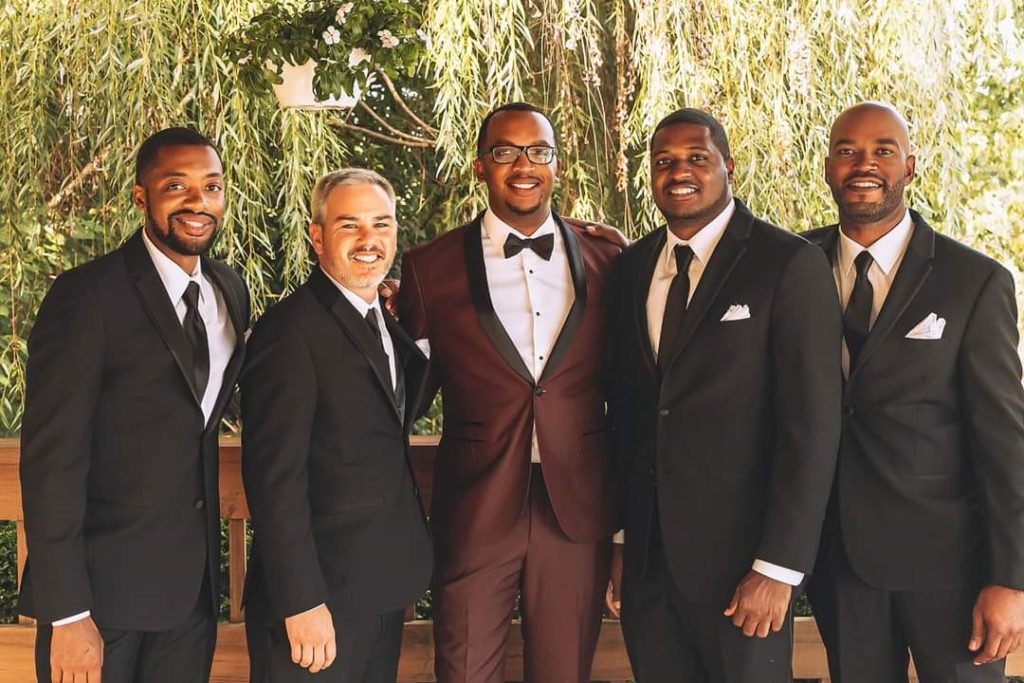
L to R: Christopher Hawkins, First Tee – Metro Atlanta alumnus and First Tee Scholar Class of 2003; Adam Ruegg, Troon Golf; Steven Outlaw, First Tee – Lake County alumnus and inaugural First Tee Scholar; Rod Jackson, First Tee – Metro Atlanta alumnus; Brandon White, First Tee – Lake County alumnus and current Program Director First Tee – Lake County.
As the inaugural First Tee Scholar, Steven graduated from Georgetown College with a degree in political science. After college, he enrolled in the PGA, PGM Accelerated Program. After completing two levels of the program, he secured an internship with Troon Golf, a leading golf management company. He has since worked with Troon Golf for nearly 15 years, starting in Arizona and traveling overseas to work in the Middle East, and in Malaysia managing The Els Club Teluk Datai (rated #83 in the world by Golf Digest in 2016).
More recently, Steven serves as the PGA Director of Golf at Wickenburg Ranch Golf & Social Club, managed by Troon Golf. Steven has been a PGA Class A Professional for more than 10 years and currently serves on the Southwest Section PGA Board of Directors and is very active with Troon’s D&I Council. Going forward, Steven aspires to ascend the ranks in the PGA of America, with a passion specifically around diversity, equity and inclusion and positive change within the game of golf.
Though Steven had numerous amazing opportunities during his time as a First Tee participant, he now prides himself in exploring what he can do for First Tee as an adult. He works closely with First Tee – Lake County, often supplying the chapter with donations.
“These opportunities would not have been possible without First Tee and the core values instilled in me such as perseverance and confidence. Much of what I learned during my time with First Tee I use now to strengthen and empower my team. I am forever grateful and honored to be part of such a great organization. I look forward to the future of First Tee and the path they will pave for the next generation.”
Eleven years after Steven’s speech, the First Tee Scholars Program continues to thrive. It has since received a face-lift following Greg McLaughlin being named First Tee CEO in 2019.
Relaunching officially in 2020, President George W. Bush, honorary First Tee chair, congratulated the first class of the revamped program. First Tee College Scholarship Program now extends its impact to alumni beyond financial support, providing personal and professional development throughout their post-graduate careers.
Each of the Scholars is paired with a dedicated, trained adult mentor who helps encourage and guide them throughout the college experience, including virtual and in-person meetups. The program also provides professional development workshops held in-person throughout the year, and up to $5,000 per year toward tuition.
“First Tee aims to inspire and empower every young person in the program to set goals and begin pursuing them,” said McLaughlin. “The First Tee College Scholarship Program is intended to motivate young people to stay in the program and support alumni as they matriculate through the college.”
In recognition of First Tee’s 25th anniversary, the Class of 2022 includes 25 First Tee Scholars. This time, Steven Outlaw has turned the tables, joining as a mentor to one of the Scholars.
“I was extremely fortunate to be surrounded by great professionals as I progressed through my time with the First Tee. These individuals helped me grow not only in golf, but personally and professionally. I consider myself lucky to be able to return the favor to the next generation!”
We believe in helping youth succeed – on the golf course and in life. Learn more about our programs and how you can get involved.
